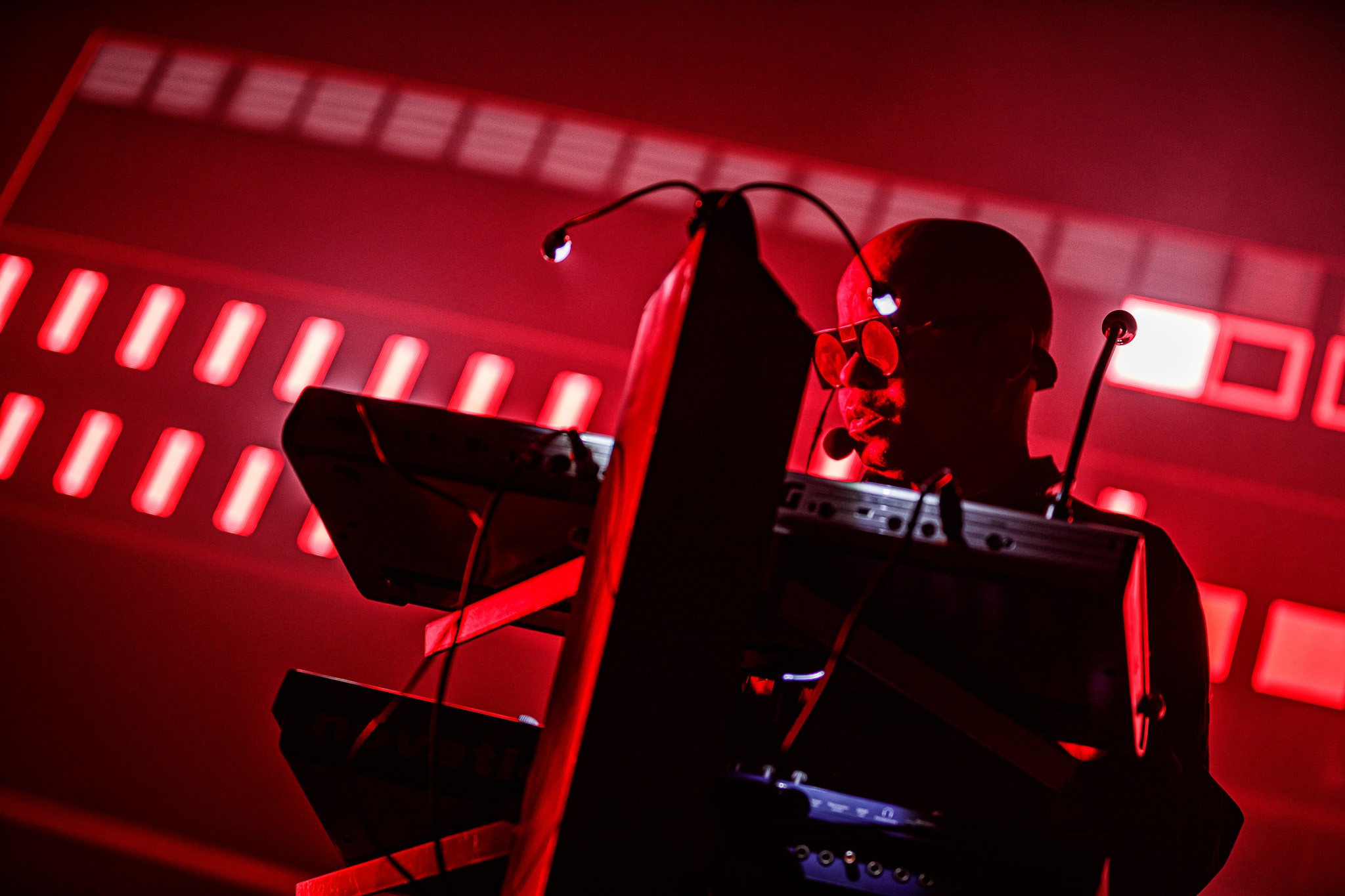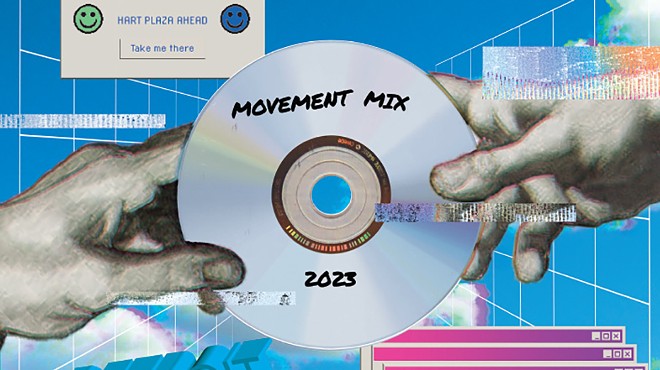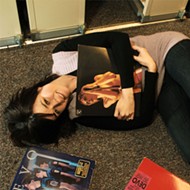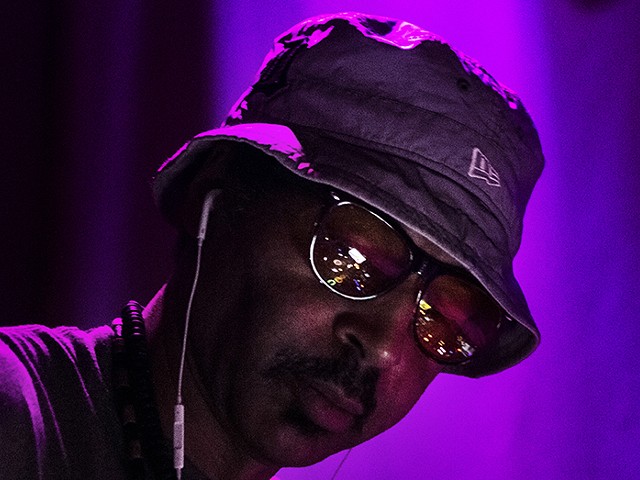As a founding figure of techno, one of modern-day music’s most influential genres, it’s somehow surprising to see how unguarded and open Juan Atkins can be. After all, techno was seemingly created from the shadows, dispersed in dark warehouses, and heard but not seen through Detroit’s airwaves in its formative years of the 1980s. There’s a lot of mystery to unpack.
Atkins acknowledges that there was some sort of cosmic wave he and Rik Davis were following when they created the very first experimental sounds that became Cybotron, but he also never forgot his formative moments of discovering Parliament-Funkadelic and entirely new worlds with each weekend of world music festivals at Hart Plaza. In many ways, his main stage performance as Cybotron at this year’s Movement Festival is the culmination of all those early years of inspiration and exploration, combined with what’s become a sudden future state that his music has always gravitated toward. For him personally, it’s also a vision come true.
No one expected the future to come from Belleville, Michigan. That’s where Atkins was enrolled for a Future Studies course in high school where on top of the assigned reading list was 1970’s Future Shock, written by Alvin Toffler (and his wife, Heidi Toffler, who remains uncredited). The book gives a sharp analysis of the effects of a society undergoing rapid technological change, resulting in “information overload” on a large scale, and all the societal effects that come with it. Finding a fitting protagonist in Toffler, Atkins started to view his own musical endeavors in a futuristic light.
Before he met Davis at Washtenaw Community College in a music theory class in 1980, he had just taken in Toffler’s The Third Wave, and was ready to create something from another time and space. “In his books, [Toffler] had a term called ‘Future Speak’ which was a combination of words. This was the theme that we used to create different words. We even had what you call a ‘Techno Speak’ dictionary that I and Rik developed. We were basically developing not only a new genre of music, but we were also developing a new genre of language as well to coincide with this new futuristic technological revolution that we were engaging in.”
This was the inception of Cybotron. The name itself is a Techno Speak mash-up of the words cyborg, a then-fictional concept of a being that’s both biological and technological, and cyclotron, a machine created for the purpose of experimentation with nuclear physics. Throw in a generous dash of cyberspace for good measure.
Remarkably, the first-ever Cybotron live show in Detroit will be this Memorial Day Weekend at Movement.
tweet this
It’s a name that could have come off like proper science fiction — too far gone in the Man-Machine dilemma to make any real sense. But by the time the first single was released in 1981, “Alleys of Your Mind,” the name (and concept of) Cybotron felt like the teleportation device everyone had been waiting for to catch a ride to that next phase.
Riding on cosmic — even psychedelic — grooves was something Atkins had been well accustomed to from an early age. He recalls a pivotal moment when Funkadelic’s Cosmic Slop had his full attention. He purchased a copy of the album in the now obsolete format of the 8-track tape. “The thing about 8-track tapes,” says Atkins, “is that it was just a big loop, and so the whole album would just loop and loop and loop. I listened to the whole album just continuously for hours straight.” It’s likely that the very notion of the constant looping of the 8-track had just as much influence on Atkins as the music itself.
Atkins was still a kid when he went to see Parliament-Funkadelic perform live. George Clinton, frontman of the famed New Jersey act, acknowledged the young Atkins backstage. To hear him tell the story calls up that feeling of giddiness we’ve all had when being in the presence of one of our heroes.
“[It was] one of the first concerts that I went to, if not the first concert. I was backstage like a groupie, waiting for them to come off the stage. George came past and for some reason, he rubbed my head. I must’ve been like 10 or 11 years old. He came by and just rubbed the top of my head like I was a good little boy or something. He just kept on walking past. I don’t think I shampooed my hair for about a month after that,” Atkins says, laughing.
It would be years before he would meet George Clinton again during the Detroit Electronic Music Festival (the first iteration of Movement) in 2002. Both artists performed that year and were provided accommodations at The Marriott adjacent to Hart Plaza. “I had been through various channels trying to collaborate with George,” Atkins says. “He actually came to my hotel room and gave me a tape with some ideas.” The tape contained a sample library but nothing that could work as a full collaboration.
It’s possible Clinton thought that a sample library is exactly what Atkins would want. It’s also possible that the idea of an electronic musician known in a world with close association with DJs was as misunderstood by Clinton as by any other casual observer. The rest of us are left to wonder what’s become of that tape, or what could still yet become of it. You can land on the same mothership, but sometimes you’ve been on a different journey.

Since starting Cybotron, collaboration has been second nature for Atkins, whether working with fellow musicians from Detroit and elsewhere or releasing his own music and supporting others on his Metroplex label. The word Metroplex itself is a Techno Speak combination of the words metropolitan “like the metropolitan area” and complex “like a complex, a mall or apartment or any type of complex.” The idea of Metroplex points to a sophisticated and fashionable group of ideas and people converging at a common understanding. The name also lends itself to include those from the surrounding areas outside of techno’s origins, and the message seemed to be received by communities from around the world.
He received an invitation to visit Berlin when he met Thomas Fehlmann (The Orb, Sun Electric) while both artists were at Trevor Horn’s ZTT offices in London in the early 1990s. He accepted the offer. “I had met [Thomas] previously. He had come to Detroit with Moritz Von Oswald and Mark Ernestus — the Basic Channel and Chain Reaction crew. They were buying up keyboards and stuff from pawnshops in Detroit, and taking them back to Berlin and retrofitting them with MIDI.”
Atkins was referring to the technology invented in 1983 that allows for the syncing of electronic musical equipment. The technology is now embedded in digital music-creation software today, but it wasn’t yet a part of analog equipment. MIDI’s equipment (and sound) syncing capability has left an indelible effect on all music that we hear today. “[Fehlmann] said, ‘Would you like to come to Berlin? And, you know, maybe we can do some work?’” That’s when the Detroit-Berlin connection was made.
Atkins played the famed Tresor club for the first time, where both he and fellow Detroiter Jeff Mills played in the basement. 3MB (short for 3 Men in Berlin) came together, pairing Juan with Fehlmann and von Oswald (Atkins and Eddie Fowlkes sometimes switched roles in the trio). The Berlin friendship also brought new material from Atkins’s Model 500 alias, originally created about a decade previously upon the introduction of Metroplex Records with the single “No UFO’s.” First, there was the Sonic Sunset EP, followed by the first full album called Deep Space, much of which was recorded with von Oswald as the engineer at his Love Park Studios. “The experience for me was very enlightening because I had the chance to see first-hand how Detroit influenced artists in Berlin. And it was basically coming back through those collaborative experiences.”
It felt like his music had entered a new phase. Atkins’s classic signatures remained, and he continued to uphold a band mentality. He still refers to Cybotron as a band, with a studio, contradicting the frequent “man in a room” view of how others understand the creation process of techno. Through this next phase, what was highlighted yet again is that Atkins remained steadfastly a futurist dedicated to evolving his ideas through time, technology, and space.
It was a stroke of genius that the late avant-fashion designer Virgil Abloh included Cybotron in his unveiling of the Men’s Fall-Winter 2020 Fashion show for Louis Vuitton. It wasn’t merely the music of Cybotron playing in the background, nor was it Atkins as a DJ. Abloh enlisted Cybotron by way of a live performance. Abloh met Louis Vuitton’s sophisticated, classic cuts with a futuristic vision accompanied by a soundtrack that was as far out as the clothing itself.
The Louis Vuitton event was the last show that Cybotron has performed until now, but it was only the fifth live show ever performed by them. In fact, the first live Cybotron show ever was in London at the Barbican in 2019 — nearly 40 years after the band’s inception. Remarkably, the first-ever Cybotron live show in Detroit will be this Memorial Day Weekend at Movement.
This is where Cybotron gets a little complicated. Since developing their vision at the start, Atkins and Davis haven’t always been able to come together on the same terms. As Atkins puts it, “One time, we wanted to get together and record, somewhere around 1991. I had already started Metroplex Records and Model 500 and all of that. The techno movement had kind of taken off and I was dead in the middle of this whole thing.” The two started talking about making new music together, but couldn’t agree on how to approach it. According to Atkins, Davis wanted Atkins to devote all of his energy to the project. “On one hand, I could kind of understand where he was coming from. On the other hand, it didn’t make sense for me to quit everything else that I was doing when the ball was rolling at a million miles an hour already. I couldn’t stop it if I wanted to.” (Metro Times was not able to reach Davis for his comments.)
The two weren’t able to work out arrangements to perform together for the show at Movement, and they each take ownership of the Cybotron brand with music releases and performances. Davis has two releases as Cybotron (the single “Eden” and the album Cyber Ghetto), while Atkins continues to perform under the name and is in the process of recording new material for a forthcoming release. Atkins’s most recent live performance as Cybotron was in Paris with Detroit musician Tameko Williams and Laurens von Oswald, nephew of Moritz von Oswald. It’s unclear if the two will ever work together again.
What they have put out into the world is perhaps something all their Techno Speak had never accounted for. Atkins has always been proud of techno, even protective of the term in the past. When asked who techno belongs to today, he’s clear. “I would say techno belongs to the world. Techno belongs to the world citizens.” Seemingly taking a spin from the latest technological advances, he adds, “Techno is short for technology. Technology and music belong to everyone. I just happen to be fortunate enough to be one of the artists at the forefront of this third wave of music — the third wave in society.”
Yet, even he could never have envisioned an annual electronic music festival taking place in Detroit. The way he remembers Hart Plaza as a child was when his grandmother would take him there on any given summer weekend for the ethnic festivals. “My grandmother would take us and we would see a lot of different cultures, their music and dances,” he recalls. It opened up a traveling-without-leaving idea that the world is bigger than he had ever imagined. It also set Atkins up for what to us seems inevitable. “I always envisioned myself, based on these festivals, one day being able to perform in the arena in the plaza, on the main stage of the plaza. I dreamed that I would be up there playing, and eventually, it came to fruition.”
Cybotron is scheduled to play at 8:15 p.m. on Sunday, May 28 at Movement Music Festival at Hart Plaza; see movementfestival.com for more information.
Subscribe to Metro Times newsletters.
Follow us: Google News | NewsBreak | Reddit | Instagram | Facebook | Twitter








